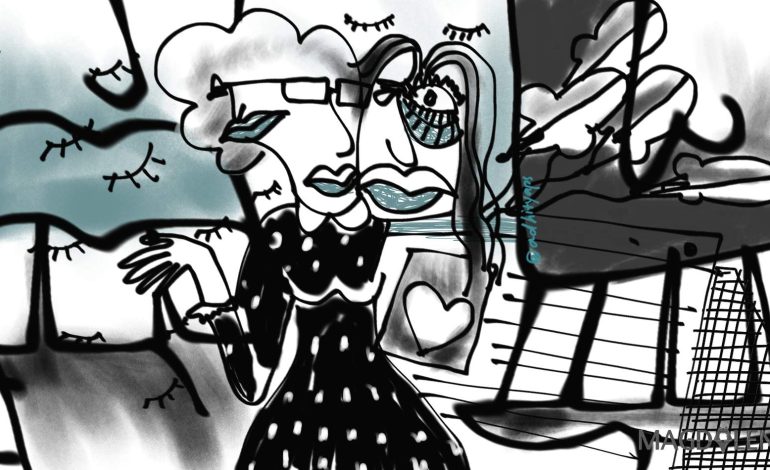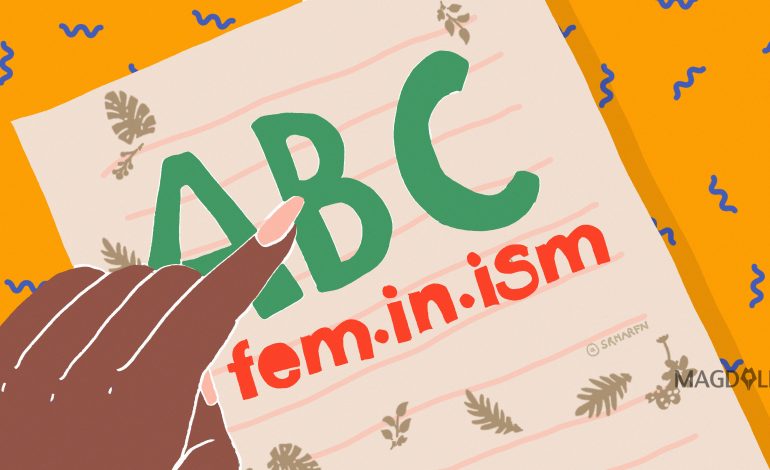Balinese Writer on Theatre, Community and Decolonizing English Literature

On a corner of a small street near the beach in Singaraja, North Bali, at a house bearing the sign “Komunitas Mahima,” dramatist and lecturer of English literature Sonia Piscayanti greeted me. I had wanted to visit the mother of two for months, but COVID-19 restricted my movement. Since the situation seemed to be more under control, now was the time to drive up North.
Entering the building, I wasn’t sure if it was her house or a bookshop. A large bookshelf covered the left wall of the room. In the middle of the space, next to the couch were stacks of books. Sonia welcomed me wearing a face mask and apologized for the “chaotic” sitting room. We sat opposite each other, keeping a physical distance. Her husband worked in the adjacent room, which is also used as a theatre performing space. Behind Sonia’s sofa, a writer in residence sat on the floor reading a book by French philosopher Jean-Paul Sartre, and her youngest child played videogames on a phone.
Sonia told me about the first radio interview her daughter (13) would do that afternoon as an expert about the rise of K-pop’s popularity in Indonesia. She raises her daughter as a feminist and wants her to grab the stage, find her own voice and speak out whenever she has something to share with the world. It is something she actually does to everyone, especially Balinese women like herself.
She founded the non-profit organization Mahima Institute Indonesia together with her partner with the aim of empowering people through education, arts and culture. Her project “11 Ibu 11 Panggung 11 Kisah” (11 Mothers 11 Stages 11 Stories) got a lot of attention last year at the Ubud Writers and Readers festival, where I saw her speak in a panel discussion entitled “Enlightenment for all” about the melting pot of ceremonies and practices, local and foreign, traditional and modern Bali has become. She calls her project her best work so far because the stories of eleven housewives made her realize “theatre and literature can enable mothers to let their voices be heard”.
A mother of three who poisoned her children and herself, and survived the desperate action, inspired Sonia to start “11 Ibu.” Through theatre performances, the project raised awareness in Balinese communities and has gotten her invited to festivals around the world. As an experimenter, as she calls herself, she likes to tell stories in multiple ways. The discussion about literacy in Indonesia is “superficial,” she said. It’s not just about reading and writing: “It’s about the skills you have to contribute to our global society.”
It was actually her attitude during the debate at the Ubud Writers festival that triggered my attention. Bali has become a hotspot for everyone looking for spirituality and the way it has been practiced by a lot of foreigners visiting the island doesn’t seem to relate to the traditional Balinese approach of living a spiritual life.
Writer Sanne Breimer (right) with Sonia Piscayanti.
“I don’t really believe in tourism,” she said, “the Balinese are too dependent on tourists. When there’s an earthquake or a pandemic the tourism is immediately gone. This current situation proves to us that we need to reinvent ourselves and think about how language and art form our culture. COVID-19 forces us to look for wealth inside of ourselves.”
“The younger generation who’ve lost their jobs in the hospitality industry now return to their villages, rediscovering how to plant the garden, how to reuse energy and preserve our culture. The virus is a blessing in that sense, we learn to question ourselves and think about God’s intention to create us. We’ve been asking ourselves these questions every day already and I’m happy to see more people becoming aware now”.
The right timing is important to the writer, she’ll repeat that concept a few times during our chat: “If we start doing things out of routine, there is less excitement involved. Repetition is boring. Society needs more people who focus on growing.”
Sonia’s life consists of executing multiple projects at the same time, in addition to her main job as an English literature lecturer at the Ganesha University in Singaraja.
“Oh my God, so many plan,” she says laughing when sharing all her ideas. Not all her wishes come true though, like the intention she had a few years ago to go abroad and study in Australia for a while. It turned out to be too difficult to be separated from her family.
“As a Balinese woman when you get married, you don’t just marry your husband, you become part of a community where you’re expected to contribute,” she explains.
Bridging different worlds – being a mother and a wife on the one hand and a writer, academic and speaker on the other – is something Sonia is used to. Even in her work, she shifts between her community of “real people” whom she meets during performances, book presentations and language classes, and her academic work for which she’ll spend hours by herself working on her doctoral degree.
“The good thing is that I have more time at the moment to study and develop myself. If I want to pursue a career as a professor I need to publish more. Engaging with real people always feels more alive and accessible. Academic work is more formal and structured. My struggle is to find a balance between both worlds.”
An academic career is important to her personally because of the concept of being a civil servant and contribute to society until retirement. However, her Komunitas Mahima is necessary to fulfil that task as well: “I need my feet in two powers, both formal and informal.”
Of marriage and building a community
Her husband introduced her to the idea of community. Before she met him, she was (and still is) “a textbook person.” Growing up in a traditional Balinese family without a lot of money to spend, Sonia would sneak in and out of the library regularly, reading the books of English children’s writer Enid Blyton and fantasizing about visiting places around the world. The anime phenomenon Sailor Moon made her familiar with the principle of girl power and the ability of women to change the world and make it a better place. She found it hard to see her mother being at home all the time.
“Her presence was very valuable to us, but maybe if she had developed herself more, I would have done so too,” she told me. It was one of the reasons she created a community that she herself didn’t have as a child. Her friends say she’s lucky to have met a husband who supports her in her work as a feminist – unusual for Balinese men who tend to put themselves first.
When they met, he told her he was a contemporary poet. Before that she didn’t believe such a thing existed, as she was used to reading dead poets. Their first project together was the poetry reading competition they organized three times since 2003 for the Buleleng regency, a big event that eventually led to the founding of Komunitas Mahima six years later.
It wasn’t clear from the beginning that he would be her life partner, the age difference being one of the reasons to doubt a serious relationship. This is where her spiritual mindset shows in the conversation, saying “everything is designed by God so perfectly.” (although, she said, when she asked God to give her a sign whether he was the one, she never got it).

Mahima Community. This pics were taken after their performance of musical poetry in Festival Bali Jani 2019.
Instead, her husband told her after three years of dating that he was “done with the drama,” and was “too old to play.” He asked her to “just say yes or no.” He criticizes her work and her mother told her that if she didn’t like him she should just leave him. But Sonia felt it was their destiny to have met each other. The battles they fight make her work better. She calls herself “a mathematician” and calculates her time: “If not now, then when? He was 38 years old at the time, he lived a stable life financially, and I thought of the possibility of having kids together also.”
Deep down she had never thought she would get married, believing in the image of being a free woman, financially independent and happy by herself.
“But then I met him,” she said jokingly and pointing towards her husband who was sitting behind his desk three meters away. “He convinced me that my feminist thinking was good, but he wanted me to try out something else as well, so we could walk that path together. I was so stubborn at the time; men would run away when they came closer. He introduced me to living the life of a poet, a life I didn’t know was possible.”
They share the same vision in life, he opened up her small world of textbooks and showed her there’s a world outside reading: “Literature still is the soul, but through education, we can build connections. As a technique to transfer the soul.”
This brought our talk back to preserving the soul of her home country. As an English literature teacher, she read Shakespeare, the American poetry of Robert Frost and Sylvia Plath and the work of Scottish poet and lyricist Robert Burns. All foreign writers. When she became a lecturer, she decided to stop using the work of Shakespeare’s in her class.
“We don’t know what happened in that era, it’s too far from our own lives here in Indonesia”, she explained. She started a movement to “bring back our voice” and decolonize the curriculum.
“It’s like telling your students to eat pizza, which they can’t digest because they’re not used to eating it, so they’ll have diarrhea. Instead, they should cook nasi goreng and write about their own lives, their friends, their neighbors. Rebranding English literature is a big agenda for me. We need the language to introduce ourselves to the world, otherwise, we won’t get noticed. But at the same time, it’s important to empower our own voice and tell our own stories through this language.”
In that sense COVID-19 has unexpectedly empowered people, especially women. With many men losing their jobs in the tourism industry, more women started their own small businesses selling food.
“In Bali, women are the rulers of our culture. Wherever you go, to a neighborhood or village, you’ll find women being leaders,” she said.
As if to illustrate her instinct to “fire up” others, she continued: “I refuse to accept the belief that women can only be at home being silent and not speak up. I do whatever to motivate people to grow, giving young writers confidence to get their unique voices heard and think about their responsibility in our society. I’m tough: I ask my children daily ‘what is your plan in life?’”






















